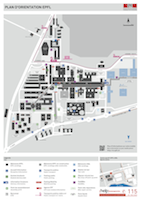Go to
Ian O'Connor
Synthesis and DSE techniques for matrix-based ambipolar logic architectures
 Professor
Professor
Department of Electronic, Electrical and Control Engineering
Ecole Centrale de Lyon
Lyon, France
Friday, 29 September 2017 at 11:20 in room BC 420
Abstract:
The advent of high-performance computing architectures is necessary to follow Moore's Law and allow the execution of future software applications both in terms of resolution (audio, video and scientific computing) and in terms of computing power or MIPS (real-time coding/decoding, data encryption/decryption). However, the use of conventional technologies will lead to several device-level hurdles (leakage currents, interconnect limitations, quantum effects …) It is widely recognized that conventional technology scaling will at some point break down in the face of these limits, both for fundamental and for economic reasons. Alternatives must be found, at both architectural and device levels. In this context, the emergence of new switching devices based on nanotubes (CNFET) or nanowires (NWFET) offers the opportunity to provide novel logic building blocks, to explore new possibilities for digital design and consequently to reconsider the paradigms of computing architectures to achieve orders of magnitude improvements in conventional figures of merit.
In this talk, I will look at the emergence of such technologies and assess their potential in the context of computing and communication in future reconfigurable computing platforms. I will firstly present technologies capable of building large regular structures out of silicon nanowires or carbon nanotubes, and then techniques to enable logic functions to be mapped onto them, particularly in the context of reconfigurable applications. Some pointers to the future evolution of these technologies, enabling design techniques and associated architectures will be given, as well as the issues that must be solved before nanoscale computing fabrics become a viable alternative to CMOS.
About the speaker:
Ian O'Connor is Professor for Heterogeneous and Nanoelectronics Systems Design in the Department of Electronic, Electrical and Control Engineering at Ecole Centrale de Lyon, France. He is currently head of the Heterogeneous Systems Design group at the Lyon Institute of Nanotechnology. Since 2008, he also holds a position of Adjunct Professor at Ecole Polytechnique de Montréal, Canada. His research interests include novel computing architectures based on emerging technologies, associated with methods for design exploration. He has authored or co-authored around 150 book chapters, journal publications, conference papers and patents, has held various positions of responsibility in the organization of several international conferences and has been workpackage leader or scientific coordinator for several national and European projects. He also serves as an expert with the French Observatory for Micro and Nano Technologies (OMNT), IFIP (International Federation for Information Processing) WG10.5 (Design and Engineering of Electronic Systems), and ALLISTENE (Alliance for digital science and technology).
Secondary navigation
- EPFL Workshop on Logic Synthesis and Emerging Technologies
- Luca Amaru
- Luca Benini
- Giovanni De Micheli
- Srini Devadas
- Antun Domic
- Rolf Drechsler
- Pierre-Emmanuel Gaillardon
- Jie-Hong Roland Jiang
- Akash Kumar
- Shahar Kvatinsky
- Yusuf Leblebici
- Shin-ichi Minato
- Alan Mishchenko
- Vijaykrishnan Narayanan
- Ian O'Connor
- Andre Inacio Reis
- Martin Roetteler
- Julien Ryckaert
- Mathias Soeken
- Christof Teuscher
- Zhiru Zhang
- Symposium on Emerging Trends in Computing
- Layout synthesis: A golden DA topic
- EPFL Workshop on Logic Synthesis & Verification
- Luca Amaru
- Luca Benini
- Robert Brayton
- Maciej Ciesielski
- Valentina Ciriani
- Jovanka Ciric-Vujkovic
- Jason Cong
- Jordi Cortadella
- Giovanni De Micheli
- Antun Domic
- Rolf Drechsler
- Henri Fraisse
- Paolo Ienne
- Viktor Kuncak
- Enrico Macii
- Igor Markov
- Steven M. Nowick
- Tsutomu Sasao
- Alena Simalatsar
- Leon Stok
- Dirk Stroobandt
- Tiziano Villa
- Symposium on Emerging Trends in Electronics
- Raul Camposano
- Anantha Chandrakasan
- Jo De Boeck
- Gerhard Fettweis
- Steve Furber
- Philippe Magarshack
- Takayasu Sakurai
- Alberto Sangiovanni-Vincentelli
- Ken Shepard
- VENUE
- Panel on Circuits in Emerging Nanotechnologies
- Panel on Emerging Methods of Computing
- Panel on The Role of Universities in the Emerging ICT World
- Panel on Design Challenges Ahead
- Panel on Alternative Use of Silicon
- Nano-Bio Technologies for Lab-on-Chip
- Functionality-Enhanced Devices Workshop
- More Moore: Designing Ultra-Complex System-on-Chips
- Design Technologies for a New Era
- Nanotechnology for Health
- Secure Systems Design
- Surface Treatments and Biochip Sensors
- Security/Privacy of IMDs
- Nanosystem Design and Variability
- Past Events Archive
On-Line Registration
Workshop registration is mandatory but free of charge. Please click here to go to the on-line registration form.
Thank you very much for your interest in our workshop. Registration is now closed.
Downloads
Presentation slides:
Venue
All talks will take place at EPFL room BC 420. Please click here to go to the interactive EPFL map.

